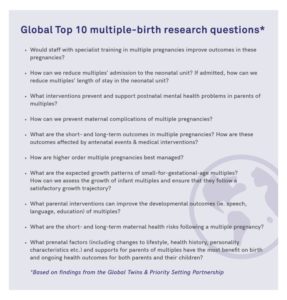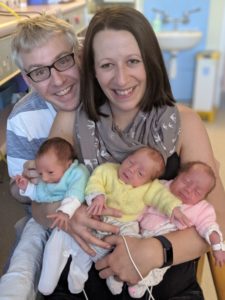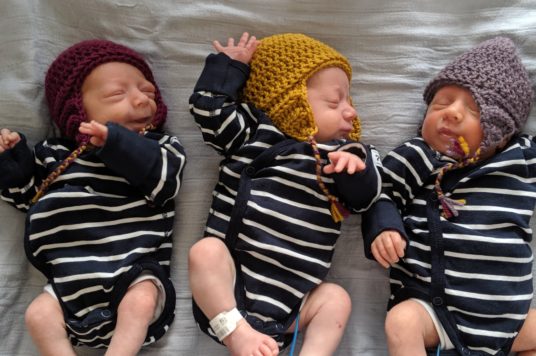Family of triplets support urgent need for multiple birth research
The parents of newborn triplets are supporting multiple birth experts from around the world who have identified where urgent research is needed to improve health outcomes for multiple babies.
In a world first initiative, supported by the twins and multiple births association Tamba, a paper published today (10 October) outlines the top 10 global research priorities for multiple birth health and how these priorities were chosen from wide-ranging suggestions across 31 countries.
Shelley and Marcus took part in the Global Twins Priority Setting Partnership event held at St George’s earlier this year before their triplet girls (pictured) were born in August.
Parents of multiple babies were joined by experts from around the world made up of health, community, research and education organisations – including Tamba, St George’s University Hospitals NHS Foundation Trust, Twins Research Australia and International Council of Multiple Birth Organisation – to discuss priorities in a workshop setting.
The priority setting partnership asked multiples and parents of multiples, clinicians, health professionals and researchers to undertake an initial survey asking them to identify their most pressing unanswered questions relating to multiple birth health.
In response, more than 1100 participants from 31 countries suggested a wide-ranging 2891 questions. A rigorous process – including the workshop event – then narrowed down the questions to a final top 10.
Marcus, father of triplets, said: “The event was really interesting, but it also gave us parents in the room the opportunity to share our experiences of multiple pregnancies and births and how this could be replicated or improved upon nationally and internationally.”
Shelley continued: “We found out at seven weeks that we were having triplets and from that moment onwards we received an incredible level of care, which included nearly weekly scans and appointments in the Fetal Medicine Unit – a multiple birth centre – at St George’s.
She added: “It was really reassuring to know that every appointment we had was with a team of specialists. We saw the same team of people each week so we forged strong relationships and had a great deal of trust in them. The level of skill and depth of the whole bench at St George’s FMU meant that we had excellent care week-on-week regardless of who was performing our scan that day.”
While Shelley and Marcus had their triplets at a specialist multiple birth centre, Professor Asma Khalil who delivered their triplets, is concerned multiple births are not being given sufficient attention globally.
Multiple pregnancies and births can bring a myriad of complications to the health of the babies and mother as well as challenges to both parents in terms of mental health, relationship stability and financial concerns.
Professor Asma Khalil, Consultant Obstetrician and Multiple Birth Lead at the Fetal Medicine Unit at St George’s and specialist advisor at Tamba, said: “The number of multiple births – twins, triplets and above – has increased dramatically around the world over the past 40 years. This is mainly due to the increasingly widespread use of assisted reproduction techniques and the older age of mothers at conception.”
Marcus and Shelley with their triplets
Professor Khalil delivered Shelley and Marcus’ triplets at 31+3 weeks gestation on 21 August via caesarean section.
Before Shelley’s caesarean section, Professor Asma Khalil introduced Marcus to everyone in the operating theatre – including the two neonatal nurses and one consultant neonatologist required per baby as well as anaesthetists, theatre nurses, midwives and clinical fellows.
Marcus said: “It was great to know who everyone was; it really put me at ease to understand the roles of those in theatre, and why there were so many people there. There were teams of specialists focused on each baby and on Shelley, which I think is hugely important in any birth, but particularly a multiple birth. This was one of the elements discussed at the priority setting event.”
Shelley added: “Throughout our pregnancy we felt that we were in the best possible hands. It felt as if everyone was rooting for us, and there was always a huge amount of multiple baby specialist support and advice along the way.
Marcus added: “We had lots of twists and turns throughout our journey, but we were so incredibly supported. We felt extremely lucky that St George’s is our local hospital as opposed to some families who must travel far for a specialist multiple birth centre. We are very aware that some families require more intervention than we did before and during pregnancy, and also afterwards with neonatal support, and we hope that these research priorities will help make the excellent care we received more widely available.”
They added that they feel privileged to be in a position to be able to support the research and priority setting for multiple births over the next few years.

We now know the important questions – but how will they be answered?
The top 10 questions point to the most pressing issues of clinical care for multiple birth babies and mothers, and psychological health and social supports for parents. This includes care during and beyond pregnancy for the short and long-term.
Professor Khalil said: “We were delighted with the response and we thank all the people from many backgrounds and countries who participated.”
She added: “The priorities identified in our paper provide researchers with a clear focus for future research. The next step will see researchers and multiple birth agencies working together – within their specific countries as well as globally – to seek funding to enable these studies to happen – and to happen quickly.”
“Evidence-based findings from our research, in turn, can guide future directions in multiple birth education and training, health care and practices, and government support and policies.
“Ultimately we hope these questions can be translated into action to benefit the wellbeing of multiple birth families around the world, now and for the future.”
Notes to editors
For media enquiries, including photos, graphics and interviews, please contact Pippa Harper, Media Manager via 020 8266 6128 or philippa.harper@stgeorges.nhs.uk
For further information about Tamba, please visit tamba.org.uk



